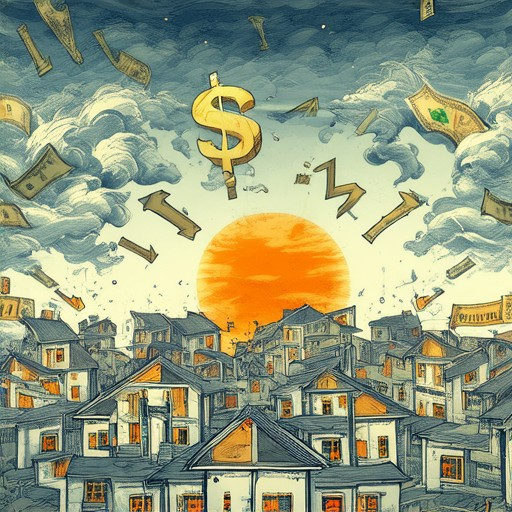The 2023 real estate market continues to evolve rapidly, with fluctuating interest rates, shifting supply and demand dynamics, and the ongoing impact of economic factors like inflation. Whether you’re a first-time buyer, an investor, or someone exploring long-term strategies, understanding the trends and predictions for the coming year is crucial. This comprehensive guide delves into the key factors influencing the real estate market in 2023, offering insights into regional trends, economic impacts, and expert opinions to help you navigate the complexities of today’s housing landscape. From analyzing whether house prices will rise or fall to examining the effects of inflation and market volatility, this article provides a detailed overview designed to empower your decision-making process. Stay ahead of the curve with actionable insights and projections that highlight the opportunities and challenges awaiting the real estate market in the year ahead.
Final Decision: To Buy Now or Wait
After carefully considering various factors, the decision to buy a house now appears favorable given the current market conditions. Here’s the structured reasoning:
- Mortgage Rates: The decrease in interest rates offers a favorable opportunity to secure lower monthly payments. Locking in these rates now provides financial protection against potential future increases.
- Home Prices: Although elevated, purchasing now allows entry into the market before prices potentially rise further. This could offer better affordability compared to waiting, especially with the current low inventory driving competition.
- Financial Readiness: With stable job growth and income stability, the timing aligns well with immediate financial capabilities. A larger down payment could reduce monthly obligations and PMI costs, enhancing long-term financial benefits.
- Market Trends and Volatility: The housing market shows signs of recovery, suggesting that early entry could capitalize on price appreciation. While there is risk associated with market volatility, the potential for long-term gains outweighs the immediate concerns.
- Professional Advice: Consulting with real estate agents and financial planners is crucial for localized insights and personalized strategies, ensuring decisions are well-informed and tailored to individual circumstances.
- Risk Management: Diversifying investments outside of real estate can mitigate risks associated with market volatility, enhancing overall portfolio resilience.
In conclusion, the decision to buy now is influenced by favorable interest rates, the potential for future price appreciation, and the immediate financial readiness. However, it is advised to seek professional guidance to navigate any uncertainties and ensure the decision aligns with long-term financial goals.

Will House Prices Go Up or Down in 2023?
The housing market in 2023 is expected to experience a mixed trend, influenced by several economic factors:
- Interest Rates: Rising interest rates, particularly after the Federal Reserve’s tightening policies, are likely to slow down demand, potentially leading to price decreases.
- Inventory Levels: As more homes come onto the market, supply may increase, possibly causing prices to stabilize or decline slightly.
- Economic Conditions: Employment strength and inflation rates will play a crucial role. A robust economy could boost buyer confidence, while high inflation may reduce affordability.
- Global Economic Trends: International buyers might reduce their activity due to economic uncertainties, impacting local markets differently.
- Regional Differences: While some areas may see price increases due to strong demand, others might experience declines as higher rates deter buyers.
Overall, 2023 is projected to see a slight cooling effect on housing prices compared to the peak years, but regional variations will significantly influence the direction of the market.
Are Home Prices Dropping in MN?
Based on current market trends and analysis, home prices in Minnesota are not expected to drop in 2025. In fact, the housing market in Minnesota shows signs of continued growth, driven by strong demand and limited supply. Here’s a breakdown of the key factors influencing the current housing market:
- Population Growth : Minnesota continues to attract new residents, particularly in urban areas like Minneapolis and St. Paul, leading to increased demand for housing.
- Job Market Strength : The state’s robust economy, fueled by industries such as healthcare, technology, and manufacturing, supports stable employment and higher wages, which contributes to housing affordability.
- Construction Activity : There has been a steady increase in new home construction projects across the state, further tightening the housing supply.
- Buyer Demand : With low inventory levels and competitive pricing, buyers are actively seeking properties, often leading to price increases.
Additionally, while mortgage interest rates have remained relatively low, they have still posed challenges for first-time buyers entering the market. However, the overall trend indicates that home prices are likely to remain stable or continue to rise in the coming months.
For more detailed insights into the Minnesota housing market, explore our comprehensive guides and resources available at RealEstateLocations.net .

Will There Be a Housing Recession in 2023?
The housing market in 2023 is expected to remain stable, with moderate growth in most regions due to low interest rates and strong demand for housing. However, experts caution against overoptimism, as various factors could influence the market dynamics.
Factors Influencing the Housing Market in 2023
- Interest Rates: Low mortgage rates are expected to keep home affordability high, encouraging buyer activity. The Federal Reserve’s policies will play a crucial role in maintaining this trend.
- Economic Growth: A robust economy with steady job creation could bolster housing demand, particularly in urban areas where supply remains constrained.
- Inflation Control: If inflation is effectively managed, household budgets will have more disposable income to allocate toward housing expenses.
- Supply and Demand Imbalance: Many markets face a shortage of available homes, which can drive prices upward despite increased construction activity.
Expert Predictions for 2023
According to recent analyses:
- CoreLogic Economist Selma Hepp: “The housing market is projected to continue its recovery from 2023 lows, supported by favorable economic conditions and low borrowing costs.”
- Zillow Research Team: “We anticipate a gradual increase in home values, with price appreciation expected to moderate compared to the peak years of 2020-2022.”
- Redfin Market Trends: “Housing inventory remains tight in many areas, leading to competitive bidding wars and higher-than-average price offers.”
Regional Variations
Housing market conditions may vary significantly by region. For example:
- Urban Centers: High-demand cities like New York, San Francisco, and London may experience continued price increases due to limited supply and high demand.
- Suburban Areas: These regions could see slower growth as buyers opt for larger homes with more space, shifting market preferences.
- Rural Markets: These areas may benefit from affordable prices and potential opportunities in smaller towns or emerging markets.
Long-Term Outlook
While the immediate outlook for 2023 appears positive, long-term challenges such as rising construction costs, regulatory hurdles, and environmental concerns could impact future market stability. Staying informed about local market trends and working with experienced real estate professionals is essential for making sound investment and purchasing decisions.
For detailed insights and updates on the housing market, visit our housing market trends section. Explore our investment guides for expert advice on navigating today’s real estate landscape.

Is Now a Good Time to Invest in Real Estate in 2023?
Mortgage rates have recently decreased from their peaks in late 2023, offering more affordable entry points for buyers. However, home prices remain elevated, with 17 consecutive months of year-over-year increases according to NAR data.
Key Factors to Consider:
- Economic Environment: Current interest rates and inflation trends play a significant role in determining affordability and investment viability.
- Inventory Levels: Assess the availability of properties in desired locations to gauge competition and pricing dynamics.
- Price Trends: Investigate local market trends to understand whether prices are likely to appreciate or stabilize.
- Job Growth and Income Stability: Evaluate regional employment statistics and income growth projections to ensure financial preparedness.
- Investment Potential: Identify areas with growth potential driven by population increases, infrastructure development, or expanding job markets.
- Tax Implications: Consider ongoing costs such as property taxes, insurance, and maintenance when budgeting for ownership.
- Investment Timeline: Determine whether a short-term or long-term strategy aligns with market expectations and personal financial goals.
Expert Insights and Market Analysis:
Consult reputable sources and market reports for forecasts and predictions that can guide investment decisions. Professional advice from real estate agents and financial planners can also provide localized insights and personalized strategies.
Diversification and Risk Management:
While real estate offers strong investment potential, consider diversifying across asset classes to mitigate market-related risks. This approach can enhance overall portfolio resilience.
Conclusion:
The decision to invest in real estate in 2023 hinges on balancing immediate financial capabilities with long-term investment objectives. Monitoring market trends and seeking professional guidance can help navigate the complexities of today’s real estate landscape effectively.
Should I Buy a House Now or Wait?
Deciding whether to buy a house now or wait involves evaluating several financial and personal factors. Here’s a structured approach to help you make an informed decision:
Current Market Trends
- Rising Prices: Home prices have been increasing, so waiting could mean missing out on lower prices. Purchasing now might offer better affordability before prices rise further.
- Interest Rates: Consider the current mortgage rates. If rates are favorable, locking them in now could be advantageous. Higher rates later might increase your monthly payments.
Your Financial Situation
- Savings and Down Payment: Assess your savings for a down payment. A larger down payment can reduce monthly mortgage costs and PMI expenses.
- Job Stability: Ensure you have stable income to comfortably manage mortgage payments. Unpredictable income could pose risks.
Opportunity Cost and Equity Building
- Rent vs. Mortgage: Waiting means continuing to pay rent, which doesn’t build equity. Homeownership can provide long-term financial benefits through appreciation and equity growth.
- Timeframe: Consider how long you plan to stay in your current location. If you anticipate moving soon, ownership might not be the best option.
Economic Uncertainties
- Market Volatility: The housing market can be unpredictable. Waiting could expose you to potential price drops due to economic downturns or market shifts.
- Mortgage Lock-In: If you’re unsure about future rate changes, securing a locked-in rate now can protect against interest rate fluctuations.
Location and Property Type
- Local Market Insights: Consult a local real estate agent to understand current market dynamics in your desired area. They can provide insights into pricing trends and potential future movements.
- Affordability: Look for properties in areas that align with your budget and long-term needs, rather than waiting for specific locations to become more affordable.
Personal Goals and Risk Tolerance
- Financial Goals: Align your decision with your short- and long-term financial objectives. Homeownership can offer stability and asset growth.
- Risk Tolerance: Understand that waiting carries uncertainty, while purchasing now commits you to a significant financial obligation. Balance these considerations with your comfort level.
Action Steps
- Consult Professionals: Seek advice from financial advisors or real estate experts to tailor your decision to your unique circumstances.
- Calculate Payments: Use mortgage calculators to compare monthly payments under different scenarios, factoring in potential rate changes.
- Assess Emotional Readiness: Prepare yourself emotionally for the financial commitment and responsibility that comes with homeownership.
Ultimately, the decision to buy now or wait depends on your individual financial health, future plans, and risk tolerance. Weighing these factors carefully will guide you toward the choice that best aligns with your financial well-being.

Should I Buy a House Now or Wait Until 2025?
Deciding whether to purchase a house now or wait until 2025 involves evaluating several factors, including interest rates, housing inventory, market trends, and personal financial readiness.
Current Market Trends
- Interest Rates: As of May 2025, interest rates for 30-year mortgages are projected to stabilize around 6.5%. While this rate may seem favorable for buyers, it’s important to consider that rates could vary and may impact monthly mortgage payments.
- Housing Inventory: The housing market is expected to remain constrained in 2025, with low inventory continuing to drive competition among buyers. This suggests that purchasing now might offer better opportunities for securing a property before prices rise further.
- Market Recovery: The housing market is showing signs of recovery, with demand potentially increasing in 2025. Early entry into the market could allow you to capitalize on recovering prices and favorable financing options.
Financial Considerations
- Financial Readiness: Assess your current financial situation. Are you prepared to handle the responsibilities of homeownership, including mortgage payments, taxes, and maintenance? Waiting may provide additional time to enhance your financial stability.
- Mortgage Options: Explore current mortgage rates and available programs. If you qualify for a fixed-rate mortgage, locking in today’s rates might offer stability regardless of future rate changes.
Personal Goals and Life Circumstances
- Immediate Needs: If you require a specific type of home or are relocating for work or family reasons, waiting might not be advisable. Purchasing now could align better with your immediate needs.
- Long-Term Vision: Consider your future plans. Owning a home is often a sound long-term investment, offering potential appreciation and financial security. Waiting too long might delay your opportunity to benefit from this growth.
Conclusion
If you are financially prepared and aligned with your personal goals, purchasing a house now could be a strategic move. The housing market is anticipated to continue its recovery, offering promising conditions for buyers. However, if you need more time to prepare, waiting until 2025 may provide the flexibility you need. Ultimately, the decision should be guided by your individual circumstances and financial readiness.




0 Comments